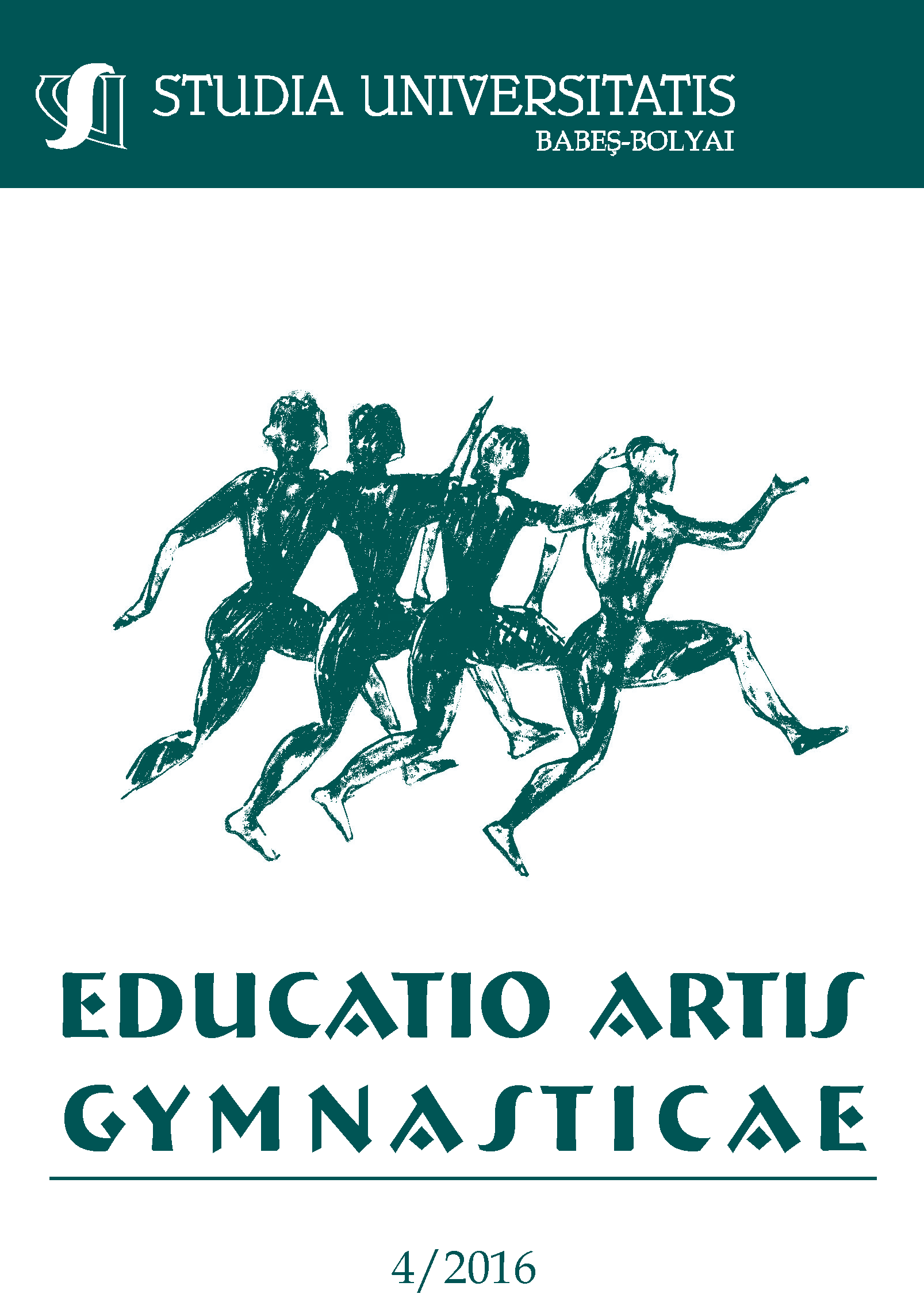SPORT, GENDER DIFFERENCES AND SEXUALITY BETWEEN SOCIAL STEREOTYPES AND EDUCATIONAL NEEDS FOR RECOGNITION OF SUBJECTIVITIES
Keywords:
gender differences, sexuality, education, sport pedagogyAbstract
Sport symbolizes a powerful instrument to propagate social stereotypes that feed and exacerbate also gender differences. The discrimination messages about gender are very frequent in sport and most of the time they have not direct and clear appearances, but the signals are implicit, hidden and nonverbal, not for this less effective. The educational instance that emerges strongly is which that consists in supporting individual paths of self-research, which could mean a suffered journey that requires difficult integrations. In light of this, what can be the educability dimension which should be supported by a sport that focuses on the individual's subjectivity, thus also his sexuality? Intending sport in a broader sense, and then considering all forms of organized activity related to movement, it might be appropriate to induce several aspects that may confer to sport an intentional educational value. It is at this point that the pedagogy is called upon to reflect critically on sports situations, to direct actions towards the construction of the learning setting that can promote wellness and well-being of involved persons. On a pedagogical perspective, is worthwhile reflect on how sport can becomes a context able to allow subjects to test themselves freely, even developing abilities and behaviors useful to feed life skills to a harmonious growth with themselves and in their own living environments. A sport supporter of universal ideals must undoubtable accept the category of difference in order to support and promote values of subjectivities.References
Bateson, G. (1979). Mind and Nature, a Necessary Unity. New York: Dutton. Trad. it. Mente e Natura, un’unità necessaria. Milano: Adelphi, 1984.
Bellantonio, S. (2014). Sport e adolescenza. L’educazione come promozione delle risorse. Milano: FrancoAngeli.
Callari Galli, M. (1996). Lo spazio dell’incontro. Roma: Meltemi.
Callari Galli, M., Ceruti, M., & Pievani, T. (1998). Pensare la diversità. Per un’educazione alla complessità umana. Roma: Meltemi.
Capranica L., Piacentini, M. F., Halson, S., Myburgh K. H., Ogasawara E., & Millard-Stafford, M. (2013). The Gender Gap in Sport Performance: Equity Influences Equality. International Journal of Sports Physiology and Performance, 8, 99-103.
Ceruti, M. (1986). Il vincolo e la possibilità. Milano: Feltrinelli.
Connell, R. W. (2002). Gender, Cambridge Polity Press: Cambridge. Trad. it., Questioni di genere, Bologna: Il Mulino, 2006.
Cunti, A. (2015). Scienze Motorie. In A. Cunti (Ed.). Corpi in formazione. Voci pedagogiche (pp. 221-226 ). Milano: FrancoAngeli.
Dunning, E., & Coakley, A. (2000). Handbook of Sport Studies, Sage: Thousand Oaks.
Fischer, K. W., & Daniel, D. (2007). Immordino-Yang, M.H., Stern, E., Battro, A., Koizumi, H., Why Mind, Brain, and Education? Why Now? Mind, Brain, and Education, 1(1), 1-2.
Gilbert, K. (1998). The Body, Young Children and Popular Culture. In N., Yelland (Ed.). Gender in early childhood (pp. 55-71). London & New York: Routledge.
Gilligan, C. (1987). In a Different Voice: Psychological Theory and Women Development. Cambridge: Harvard University Press. Trad. it. Con voce di donna. Etica e formazione della personalità. Milano: Feltrinelli, 1987.
Gross, L. (2001). Up from Invisibility: Lesbians, Gay Men, and the Media in America. Columbia University Press: New York.
Husserl, E. (1950). Cartesianische Meditationen und Pariser Vorträge, Nijhoff: L’Aia. Trad. it. Meditazioni cartesiane. Milano: Bompiani, 1989.
IOC (International Olympic Committee). Olympic Charter (accessed October 19, 2016). http://www.olympic.org/Documents/olympic_charter_en.pdf.
Isidori, E., & Fraile, A. (2008). Educazione, sport e valori. Un approccio pedagogico critico-riflessivo. Roma: Aracne.
La Cecla, F. (2009). Saperci fare. Corpi e autenticità, Elèuthera: Milano.
Lowen, A. (1958), Physical Dynamics of Character Structure (The Language of the Body). New York: Grune and Stratton. Trad it. Il linguaggio del corpo. Milano: Feltrinelli, 2001.
Mariani, A. (2015). Corpo/Corporeità. In A., Cunti (Ed.).Corpi in formazione. Voci Pedagogiche (pp. 62-68 ). Milano: FrancoAngeli.
McKay, J., Messner, M. A., & Sabo, D. (2000). Masculinities, Gender Relations and Sports. London: Sage Publications.
Merleau-Ponty, M. (1945). Phénoménologie de la perception. Paris: Gallimard. Trad. it. Fenomenologia della percezione. Milano: Il Saggiatore, 1945.
Pfister, G. (2010). Women in Sport. Gender Relations and Future Perspectives. Sport in Society: Cultures, Commerce, Media, Politics, 13(2), 234–248.
Rizzo, D. (2006). Omosapiens 1: Studi e ricerche sugli orientamenti sessuali, Roma: Carocci.
Salvini, A. (1982). Identità femminile e sport. Firenze: La Nuova Italia.
Santrock, J. W. (2008). Child Development: An Introduction. New York: McGraw-Hill. Trad. It. D., Rollo (Ed.). Psicologia dello sviluppo. Milano: McGraw-Hill.
Schaffer, H. R. (1996). Social Development. Oxford: Blackwell Publishers. Trad. it. Oliverio Ferraris, A. (Ed.) (1998). Lo sviluppo sociale. Milano: Raffaello Cortina.
Tramma, S. (2015). Pedagogia della contemporaneità. Educare al tempo della crisi. Roma: Carocci.
Ulivieri, S. (Ed.) (2014). Corpi violati. Condizionamenti educativi e violenze di genere. Milano: FrancoAngeli.
Downloads
Published
How to Cite
Issue
Section
License
Copyright (c) 2016 Studia Universitatis Babeș-Bolyai Educatio Artis Gymnasticae

This work is licensed under a Creative Commons Attribution-NonCommercial-NoDerivatives 4.0 International License.






